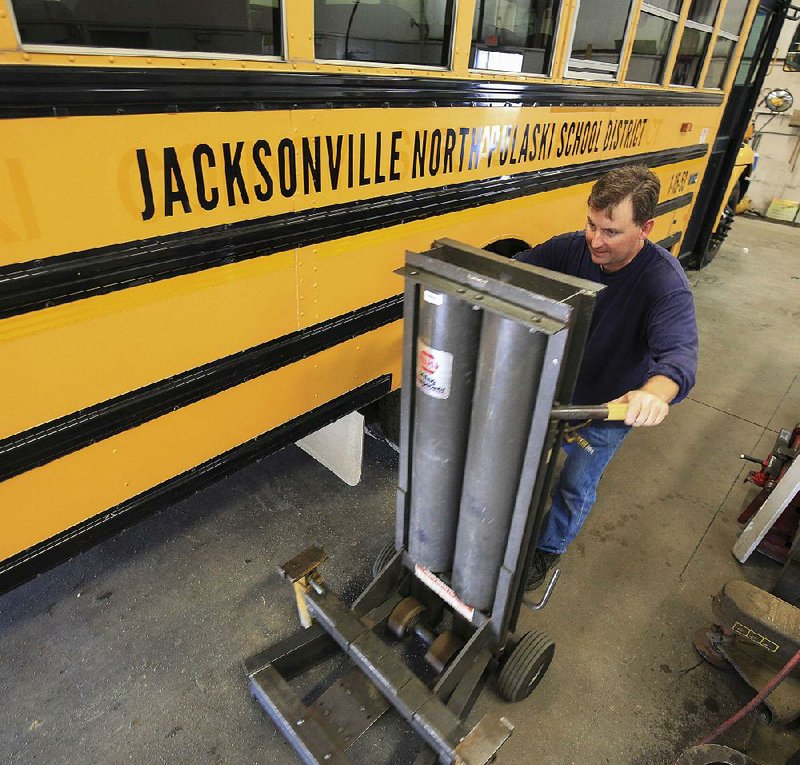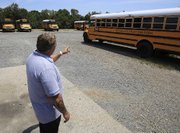Friday marked the official detachment of the Jacksonville/North Pulaski School District from the Pulaski County Special School District.
The new Jacksonville/North Pulaski system is no longer answerable to or under the direction of the Pulaski County Special system.
The detachment was decades in the making, but it began to become reality in January 2014 when a federal judge in a long-running school desegregation lawsuit approved a settlement that provided for a possible Jacksonville district.
Jacksonville-area residents followed that by voting overwhelmingly -- nearly 95 percent -- in September 2014 in favor of forming their own 100-square mile district apart from the expansive Pulaski County Special district.
In November 2014, the Arkansas Board of Education ordered the creation of the new district. That was done with the understanding that there would be up to two years in which finances would be planned, a school board elected, policies written and staff members hired. Also in that time before the district would open, facilities were to be prepared, attendance zones altered, mascots changed and assets/liabilities divided.
The immensity of organizing two districts from one district is reflected in the comments of those at the heart of it:
• Jerry Guess, superintendent of the Pulaski County Special district: "This has never been done before so everything we are doing we believe is proper to do, but the proof is in the pudding."
• Tony Wood, superintendent of the Jacksonville/North Pulaski district: "People ask me about our biggest challenge. I've got it down to this point: It's not having any history. That permeates everything. There is not anything we talk about for which we have any history."
• Beverly Williams, a human-relations consultant to the Jacksonville/North Pulaski district: "I don't think any school district in the state of Arkansas has ever had to hire approximately 270 teachers in one year."
• Daniel Gray, president of the Jacksonville/North Pulaski School Board: "It's definitely harder than anybody anticipated. It's just been a massive, massive undertaking but, that being said, I think our team, led by Tony Wood -- I don't think anyone could have managed it better. I think we are going to be set up for success from day one. We are all excited about July 1 but the bigger day is Aug. 15."
Aug. 15 the first day of school for students. It's also the day leaders of the new district want to begin demolishing the old Jacksonville Middle School North and South campuses to make way for a new $65 million high school that is scheduled to open in August 2019.
The numbers
Guess and his staff are estimating an enrollment of 4,031 in kindergarten through 12th grades for the new Jacksonville district -- with its one high school (a combination of Jacksonville and North Pulaski highs to be housed at the Jacksonville High campus), one middle school and six elementary schools. The new district is likely to be among the 25 largest of the state's 235 traditional school districts -- about the same size as the Pine Bluff and Marion school districts.
The Pulaski County Special district that enrolled 16,562 last year is projected to enroll 11,900 in 25 schools plus the Sylvan Hills Freshmen Academy in 2016-17, Guess said. That will make the district about the same size as the Cabot School District, a little bigger than the Conway district and smaller than the Fort Smith district.
The student counts for the coming year are important because they determine the amount of state aid to be distributed to the two districts, which is more typically based on a district's enrollment from the year before.
The percentages of students in the districts who qualify for free and reduced price school meals because of low family incomes will generate additional state aid. If more than 70 percent of the Jacksonville enrollment qualifies for subsidized meals -- as is projected -- the district will qualify for about $1 million more in aid than if the percentage falls under 70 percent, Wood said.
Special-education student numbers and even the 500 students remaining in the majority-to-minority interdistrict transfer program will play a part in determining the dollars flowing to the school districts.
The student-transfer program is a racial desegregation strategy that is being phased out. The two districts are sharing the $20 million in state desegregation aid, with about 25 percent of that going to the new Jacksonville district.
The Jacksonville/North Pulaski district is estimating total revenue of about $35 million. The 640-square mile Pulaski County Special district is projecting revenue of $134 million.
Real estate and equipment
"The most significant challenge has to do with the bonded indebtedness," Guess told a state-appointed Little Rock-area stakeholders group about the transfer of his district's schools and other properties, including a prekindergarten center and school bus lot, to the new district.
"We are to protect the tax-free nature of the bonds. We had a responsibility to establish the fair market value of the property in the new district that was PCSSD's," Guess said. "It wasn't a token effort. We hired an appraisal firm. We had an appraisal carefully done by professionals and we believe it would withstand an assessment by bondholders if they chose to do so."
The district also had a law firm draw up deeds and leases for the properties that will transfer to the new district in return for $10.8 million that the new district is raising by the sale of bonds.
The debt on the bonds will be paid by the Jacksonville district over time with revenue generated by the district's existing 14.8 debt service mills out of the 40.7 mill tax rate the district inherited from the Pulaski County district.
Jacksonville district voters in February approved an additional 7.6-mill property-tax increase to help pay for building a high school, an elementary and additions to four other elementaries. The new district's total tax rate is 48.3 mills.
The Pulaski County Special district will use the $10.8 million it receives from Jacksonville/North Pulaski to pay off the debt it owes on the transferred properties. That will probably happen in August.
However, the Pulaski County Special district doesn't own all the school land in the new district. Arnold Drive and Tolleson elementaries as well as North Pulaski High are on Little Rock Air Force Base property. The Pulaski Special district's leases for that land had to be transferred to the new district.
Guess said the transfer of school properties is an issue that could be a formidable barrier to other communities -- such as Sherwood and Maumelle -- that have taken preliminary steps to form their own school districts out of the Pulaski County Special district. The school property values in those places are much higher than those in Jacksonville, he said, which would make raising the money to purchase them difficult.
The Pulaski Special and Jacksonville districts are splitting not only real estate but also all kinds of inventory. School buses and other vehicles are being moved from Pulaski County Special to Jacksonville/North Pulaski.
The new district, for example, is getting 78 buses from Pulaski County Special, to serve 40 anticipated bus routes, said Phyllis Stewart, chief of staff at the Jacksonville district.
"If we have 12 trucks and we give a quarter to them, they get three," Guess said about dividing the equipment. "But if you only have seven trucks, how do you split seven trucks? We valued all of them. We established the values based on market information. We divided the value and we would give them, for example, two trucks and one car."
The Pulaski County Special district has assisted in preparing the Jacksonville/North Pulaski buildings for the new school year and expanding support for technology systems. The Pulaski County district hired as many as 79 temporary workers to help in moving equipment.
"There has been a sense of cooperation that if we don't help them, they don't succeed. If they don't work with us, we are all less than successful," Guess said.
The staffing
Another of the difficulties for the districts was staffing. Guess said reducing the 2,600 district employee numbers by more than 600 people was tough. Employees in the schools that would become Jacksonville/North Pulaski schools made up the bulk of the people who were told they would not be rehired for the 2016-17 school year.
The Jacksonville district was not obligated to rehire those employees. Instead, positions were advertised, interviews conducted, fingerprints and background checks done, and staff selections made. The district so far has hired about 230 of the 270 teachers it needs.
Williams, the human-resources consultant, displayed calendar pages filled with day after day, week after week of interviews that largely took place late on weekday nights and all day on Saturdays in locations scattered around town.
She told of one teacher candidate who reported to a school at 8:30 a.m. for a job interview only to learn the interview was really for 8:30 that night. "The candidate said 'No one interviews at night' and we said, 'We do!'"
Williams estimated that about 10 percent of the teaching staff are recent college graduates. About 60 percent of the employees previously worked in Jacksonville-area schools.
Security officers who will work in conjunction with Jacksonville school resource police officers, food-service workers, bus drivers and other support service employees also are being hired.
In all, the district will employ almost 400 people, Wood said.
Those include Jeremy Owoh, assistant superintendent for curriculum and desegregation, and Bryan Duffy, assistant superintendent for support services, who are housed in the administration building at 1414 W. Main St., in Jacksonville.
Tonya Weaver is the district's treasurer. John Sparks is director of transportation. Jacob Smith is director of student services and federal programs. Courtney Holmes is director of special education. Kevin Martin is director of technology. Clint Walker is director of child nutrition and Kevin Stalnaker is director of maintenance.
Janice Walker, Gary Beck, Karen Norton, Jamie Reed, Myeisha Haywood and Angela Stewart are the elementary school principals. Mike Hudgeons is principal at Jacksonville Middle School, which will be housed in what has been North Pulaski High. LaGail Biggs is the new Jacksonville High principal.
New policies, mascots
With a new district comes new policies and a new mascot -- the Jacksonville Titans are replacing both the Jacksonville Red Devils and the North Pulaski High Falcons.
The Jacksonville/North Pulaski district will be the only district in Pulaski County that will allow corporal punishment of students -- if the parent of a student permits that.
The district is not requiring students to wear uniforms.
Student backpacks must be clear or made of a mesh material that allows the contents to be viewed.
Student transfers to schools outside the district or even outside the student's school attendance zone are not permitted unless there are extenuating circumstances.
Employees will be paid once a month.
Student registration for the coming 2016-17 school year will be Aug. 1 and 2 at each student's attendance zone school. Aug. 5 will be the first day of work for most teachers. There will be a districtwide teacher convocation Aug. 8 at an area church.
Wood, a veteran educator who was the state's education commissioner for a short time before becoming the superintendent of the Jacksonville/North Pulaski district, marvels at the commitment Jacksonville-area residents showed over the decades to forming their own school system -- even approving a school-tax increase.
"I think there is a lot of positive energy in that we have got an opportunity that no one else has had in Arkansas," Wood said.
"We are going to make this work."
Metro on 07/02/2016

